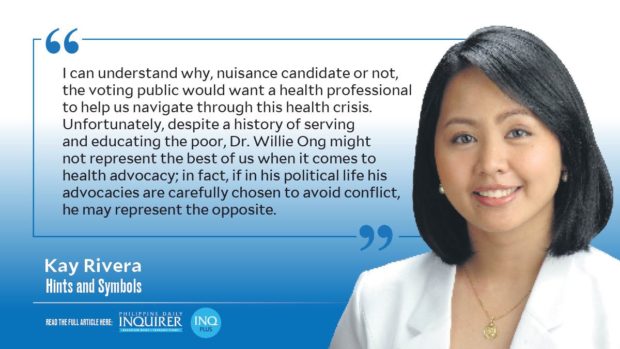Warning signs
 Filipino doctors should naturally be concerned about the state of health care. Medical practice is not done in a vacuum. The practice of even the most insular physician is affected by accessibility, by the cost of medication, by access to facilities, by the stumbling blocks encountered by patients seeking health care—income, health education, community support, or lack thereof.
Filipino doctors should naturally be concerned about the state of health care. Medical practice is not done in a vacuum. The practice of even the most insular physician is affected by accessibility, by the cost of medication, by access to facilities, by the stumbling blocks encountered by patients seeking health care—income, health education, community support, or lack thereof.
This is why physicians on social media can be quite vocal about political events. Before and during the pandemic, doctors have been vocal about medical misinformation; the plight of Filipinos with poor access to education, medication, nutrition, and health care; poor working conditions for health workers; the systems that underlie poor health funding. Medical education no longer encourages doctors to be simply good practitioners: they are encouraged, too, to be good community leaders, managers, social mobilizers, counselors, and educators in order to positively impact communities. Thus physicians opining on political matters are not necessarily overstepping the boundaries of their profession, but carrying out a quite important aspect of it.
Therefore it is not unimaginable for physicians to be interested in political life. I wrote on the matter three years ago (“A doctor in the house,” 10/22/18) as I was considering that a doctor, cognizant of the limitations of the health system in which his practice resides, may be interested in effecting change on a larger platform. I am again writing on the topic of Dr. Willie Ong, who has expressed his intention to run for vice president. Ong, 2019 senatorial aspirant, is a cardiologist who provides health education materials to laypersons on and off social media. He has millions of subscribers on his YouTube channel where he and his spouse provide easy-to-understand health tips online.
Last week, the Inquirer acknowledged that Ong “had never spoken publicly, until now, about the alleged misuse of government pandemic funds, or the slow pace of COVID-19 testing and vaccination.” Blogger “Doc Adam” Smith twits him about the same—that in a time when health professionals can speak up, he has not done so. Does every doctor need to take to social media to lambast medical misinformation, the unethical and unscientific promotion of ivermectin, the disappearance of pandemic funds? Perhaps not, as health care workers can be valuable parts of their community without ever speaking on politics. However, for a doctor with a platform followed by millions, who purports to be interested in health reform, this silence is very loud.
Many other criticisms have since been leveled against him by those in the profession. For one, his endorsement of the death penalty “for heinous crimes” is a red flag for many physicians, who find it incompatible with an oath to do no harm and a respect for human life: a thorny ethical issue for sure, but his is not the most assuring of stances. Many are also concerned that he supports lowering the age of criminal liability, a stance considered by many health and human rights groups as against child rights. It is also regretful that Ong, while vocal about the Dengvaxia issue, doesn’t seem to acknowledge how the scandal contributed to vaccine hesitancy in the Philippines. He has explained his stance and reiterates that there is no conflict between his support of current COVID-19 vaccines and his previous statements against the dengue vaccine; however, physicians concerned about public health, proposing to take an active role in it, would readily acknowledge the role that the scandal played in the rise of vaccine-preventable illness in the country, or would take public and transparent steps to correct it.
All of this is concerning, but most concerning of all are his comments when recently asked about his opinion on the pandemic response, which has clear gaps: “Wala akong sasabihin sa current administration. COVID ang kalaban.” While denying that he is an enabler of this administration he also says he has “no problem” with it, adding: “If I want to change something, I’ll keep it to myself because I’m not being asked.” Once again his silence is telling. Is he to be another Duque, physician leader in name but not in advocacy, under whom the interests of the Filipino patient will be sidelined for the sake of safety, position, or presidential favor? Such transparent, careful neutrality favors the strong and harms the marginalized.
I can understand why, nuisance candidate or not, the voting public would want a health professional to help us navigate through this health crisis. Unfortunately, despite a history of serving and educating the poor, Ong might not represent the best of us when it comes to health advocacy; in fact, if in his political life his advocacies are carefully chosen to avoid conflict, he may represent the opposite. For the sake of reforming a health system as broken as ours, the true health advocate must be unafraid to speak up against the unjust and inequitable.
For more news about the novel coronavirus click here.
What you need to know about Coronavirus.
For more information on COVID-19, call the DOH Hotline: (02) 86517800 local 1149/1150.
The Inquirer Foundation supports our healthcare frontliners and is still accepting cash donations to be deposited at Banco de Oro (BDO) current account #007960018860 or donate through PayMaya using this link.















